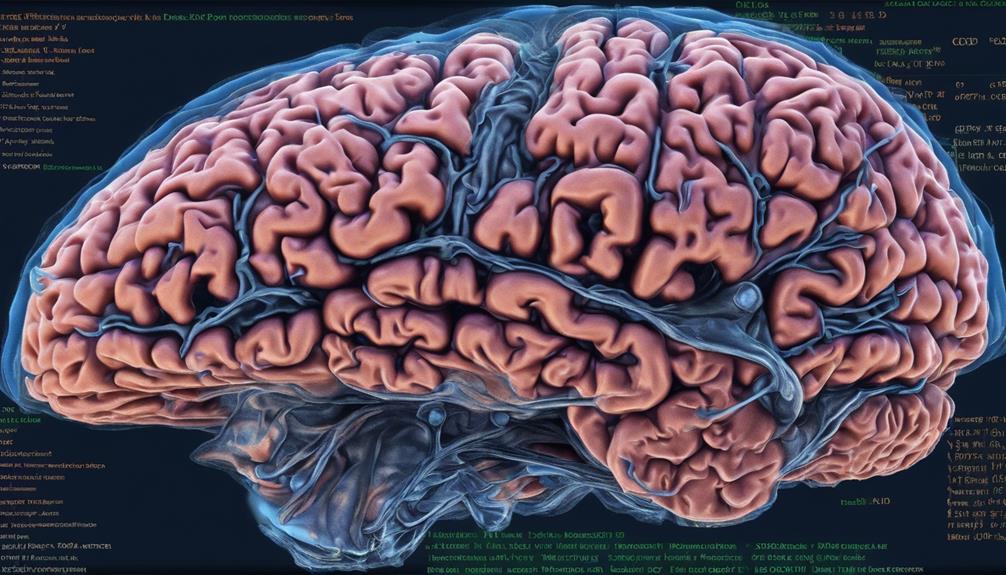Navigating the complexities of healthcare documentation can be difficult yet satisfying. Our goal as professionals is to accurately classify medical conditions to ensure patients receive the best care possible.
However, the intricacies of the ICD code for dementia present a unique challenge. Understanding the nuances of this code is crucial for proper diagnosis and treatment.
Let's explore how this code impacts patient care and the broader healthcare landscape.
Overview of ICD Code for Dementia
Understanding the classification system for medical conditions such as dementia is crucial for accurate diagnosis and treatment planning. Within the realm of dementia, the ICD-10-CM Diagnosis Code F03.90 holds particular significance. This code is designated for unspecified dementia in adult patients aged 15-124 years, encompassing cases that lack behavioral disturbances.
When patients present with symptoms like memory loss, personality changes, and emotional problems affecting their social and occupational functioning, this code becomes instrumental in the diagnostic process. Dementia, including Alzheimer's disease, brain injuries, and brain tumors, can manifest in various ways, impacting cognitive abilities over time.
Even though dementia isn't considered a normal part of aging, having a specific code like F03.90 aids healthcare providers in accurately documenting, billing, and addressing this complex condition. Utilizing the right ICD code ensures that patients experiencing dementia receive appropriate care tailored to their specific needs.
Importance of Accurate Diagnosis

Accurate diagnosis of dementia plays a fundamental role in tailoring effective treatment strategies and enhancing patient outcomes. When it comes to dementia, precision in diagnosis is crucial for several reasons:
- Targeted Treatment: Accurate diagnosis allows healthcare providers to differentiate between the various types of dementia, such as Alzheimer's disease or vascular dementia, enabling tailored care plans for each individual.
- Early Intervention: A precise diagnosis facilitates timely interventions, leading to better symptom management and improved quality of life for individuals living with dementia.
- ICD-10 Coding**: Accurate coding with ICD-10 is essential for tracking and monitoring dementia cases effectively, ensuring proper documentation and continuity of care.
- Personalized Management**: A thorough diagnostic process not only aids in early intervention but also helps in developing personalized care plans that address the specific needs and challenges faced by each person with dementia.
Ensuring accurate diagnosis sets the foundation for effective treatment, management, and support for individuals affected by dementia.
Understanding Dementia ICD-10 Code
The ICD-10-CM Diagnosis Code F03.90 specifically identifies cases of unspecified dementia without behavioral disturbance in adult patients aged 15-124 years. Dementia is a condition characterized by a decline in cognitive function that affects daily life. Symptoms of dementia, such as memory loss, personality changes, and emotional problems, can impact an individual's quality of life.
It's essential to understand the ICD-10 code for dementia to ensure accurate diagnosis and appropriate treatment. Dementia is known to affect the brain, leading to difficulties in thinking, problem-solving, and language. By utilizing the correct ICD-10 code, healthcare professionals can effectively document and track cases of unspecified dementia, aiding in proper management and care planning.
Recognizing the signs and symptoms of dementia is crucial as early intervention can help improve outcomes and enhance the overall well-being of individuals experiencing cognitive decline.
Coding for Dementia Treatment

When treating individuals with dementia, coding plays a crucial role in documenting and monitoring the effectiveness of interventions such as medication, therapy, and environmental adaptations. Here are some key aspects to consider when coding for dementia treatment:
- Pharmacological Interventions: Utilize specific ICD codes for cholinesterase inhibitors and memantine to track medication usage and monitor responses to these commonly prescribed drugs.
- Addressing Associated Conditions: Document codes for depression and sleep disturbances to indicate the comprehensive approach taken to manage these co-occurring issues alongside dementia symptoms.
- Non-Drug Approaches: Code for occupational therapy sessions to highlight the incorporation of non-pharmacological interventions in the treatment plan, promoting holistic care for individuals with dementia.
- Environmental Modifications: Use codes for environmental adaptations to demonstrate the efforts made to enhance daily functioning, independence, and overall quality of life for those with dementia through tailored environmental adjustments.
Billing and Insurance Considerations
In managing dementia treatment, our focus now shifts to navigating the complexities of billing and insurance considerations within the healthcare system. Understanding the importance of accurate coding, particularly the ICD-10-CM Diagnosis Code F03.90 for dementia without behavioral disturbance, is crucial for proper reimbursement. This specific code is billable for adult patients aged 15-124 years and has been active since October 1, 2023. Healthcare providers must utilize this code to ensure precise billing and efficient processing of insurance claims related to dementia care.
| Key Points | Details |
|---|---|
| ICD-10 Code | F03.90 |
| Patient Age Range | 15-124 years |
| Code Specificity | Dementia without behavioral disturbance |
| Implementation Date | October 1, 2023 |
Proper documentation and coding practices are essential to guarantee that healthcare professionals receive appropriate compensation for their services in diagnosing and managing dementia. Insurance companies rely on specific ICD-10 codes like F03.90 to streamline the processing of dementia-related claims, emphasizing the significance of accurate billing procedures in the healthcare industry.
Frequently Asked Questions
What Is the Correct ICD-10 Code for Dementia?
When addressing dementia, it's crucial to accurately assign the appropriate ICD-10 code to ensure precise diagnosis and billing.
The correct code for dementia is F03.90, covering unspecified dementia without behavioral disturbance. This code is billable for adults between 15 and 124 years.
Utilizing the correct ICD-10 code, like F03.90, is paramount for ensuring effective management of dementia cases and proper reimbursement in healthcare settings.
What Is the ICD 11 Code for Dementia?
We can't provide the ICD-11 code for dementia yet as it's still under development.
ICD-11 promises more specific codes for different types and stages of dementia, aiming to enhance accuracy in diagnosis and monitoring. Healthcare professionals are keen on how this code will improve classification and management.
The forthcoming ICD-11 code for dementia is anticipated to reflect advancements in understanding and diagnosing various cognitive impairments.
What Is the ICD-10 Code for F03.92?
We use the ICD-10 code F03.92 to classify cases of unspecified dementia with behavioral disturbances in adult patients aged 15-124 years.
This specific code highlights dementia cases with behavioral issues but without psychotic, mood, or anxiety disturbances.
It's crucial for accurate documentation and billing purposes. Healthcare providers rely on this code to precisely identify and manage cases of dementia with associated behavioral challenges.
What Is the ICD-10 Code for F02 82?
We use the ICD-10 code F02.82 to classify dementia in other diseases with behavioral disturbance. It's a specific code for adult patients aged 15-124 years, aiding in identifying cases of dementia with associated behavioral issues.
This code is crucial for accurate diagnostic documentation and billing purposes. Healthcare providers rely on F02.82 to effectively track and manage cases of dementia with behavioral disturbances in patients.
Conclusion
In conclusion, the enigmatic world of ICD codes for dementia leaves us pondering the complexities of the human mind.
With the precision of a surgeon, these codes navigate the labyrinth of cognitive disorders, shedding light on the darkest corners of our brains.
So, next time you encounter F03.90, remember, it's not just a code; it's a window into the intricate dance of neurons and synapses.
Stay curious, stay coding, and let the mysteries of the mind unravel before your very eyes.









